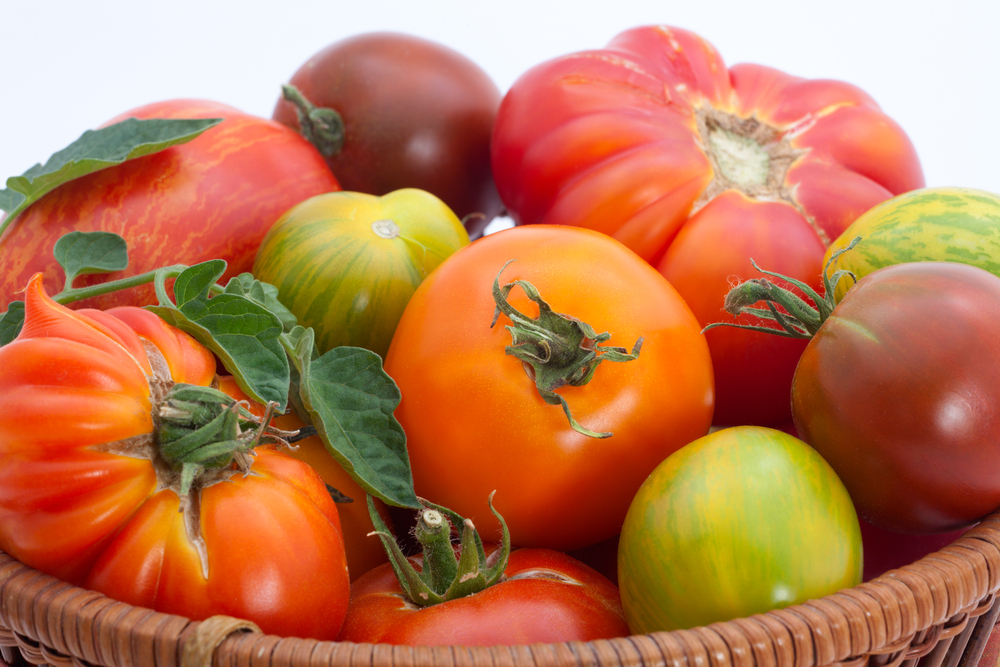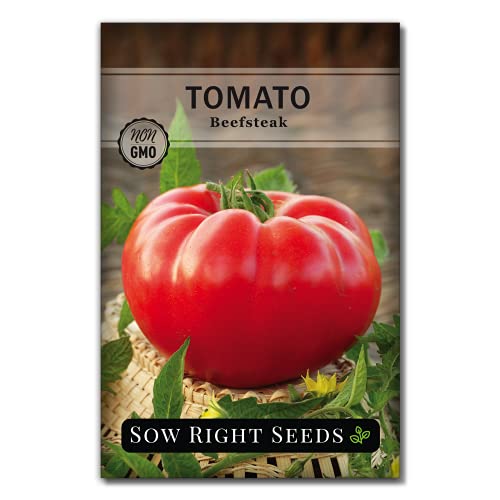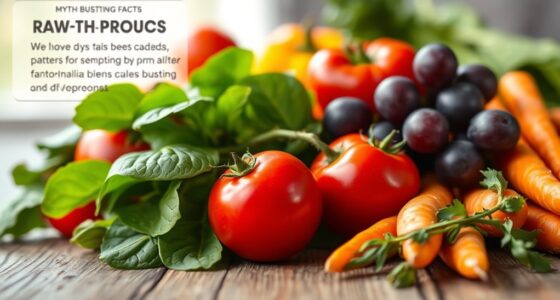Surprisingly, fresh tomatoes from your garden are packed with essential nutrients. These tomatoes are not only low-calorie but also provide fiber, potassium, and various vitamins like A, C, K, niacin, and folate. Children interested in gardening will benefit greatly from growing their own tomatoes as they are a nutritious addition to their diet.
Tomatoes contain lycopene, an important phytonutrient. This antioxidant helps shield the body against free radicals and may even prevent certain types of cancer.
| Nutrient (per 1 medium tomato, or 123 grams) | Raw Tomato |
|---|---|
| Calories | 22 |
| Carbohydrates | 5 g |
| Fiber | 1 g |
| Protein | 1 g |
| Fat | 0 g |
| Vitamin A | 20% DV |
| Vitamin C | 28% DV |
| Vitamin K | 10% DV |
| Potassium | 6% DV |
| Folate | 5% DV |
| Magnesium | 3% DV |
| Manganese | 5% DV |
Note that these values are approximate and may vary depending on the specific variety of tomato. Raw tomatoes are a low-calorie fruit that is a good source of vitamins A and C, as well as other important micronutrients. Tomatoes are also a good source of antioxidants, including lycopene, which can help protect cells from damage and may reduce the risk of certain types of cancer. Tomatoes can be enjoyed raw in salads and sandwiches, or can be cooked in a variety of ways, including roasting, sautéing, and grilling. It is important to note that some people may be allergic to tomatoes or may experience digestive discomfort from consuming large amounts of tomatoes, so it is important to be aware of any potential reactions.
Carbohydrates
Tomatoes are an excellent source of carbohydrates. Their relatively low glycemic index makes them especially beneficial to people with diabetes or other conditions that affect blood sugar levels.
These snacks are low in calories and high in fiber, which may help regulate calorie intake while improving digestion.
A small (91g) fresh tomato contains 3.5 grams of carbohydrates and 1.1 grams of fiber from naturally occurring sugars and fiber.
Another advantage of tomatoes is their potassium content, which supports healthy arteries and blood pressure. Furthermore, tomatoes contain vitamins C and lycopene–an antioxidant which shields cells against damage.
Tomatoes are also an excellent source of protein; just under 1 gram is found in one small fresh tomato.

Tomatoes contain a very small amount of fat, but this is usually in very small amounts and rarely causes concern.
Tomatoes are primarily composed of water, proteins, vitamins, minerals, phytochemicals, fatty acids and dietary fibre. Furthermore, tomatoes provide a high amount of flavonoids and carotenoids which have been known to support cardiovascular function, skin health and vision health while contributing to the prevention of gallstones or kidney stones. Furthermore, tomatoes supply iron which is necessary for normal blood cell production as well as copper which supports immunity.
Water
Homegrown tomatoes provide about 18 calories and contain 0.9 grams of protein, 3.9 grams of sugar, 1.2 grams of fibre and 0.2 grams of fat. Furthermore, they are an excellent source of potassium, vitamins A, C and K as well as niacin and folate.
Tomatoes are packed with lycopene, an antioxidant demonstrated to reduce the risk of chronic diseases like cancer and heart disease. Furthermore, studies suggest lycopene may lower cholesterol levels and regulate blood pressure.
One cup of raw heirloom or grape tomatoes offers approximately 35 calories and is an excellent source of vitamin C, potassium and lycopene. Furthermore, they provide fiber which helps you feel full and prevents overeating.
Fresh tomatoes contain relatively little sodium, unlike processed tomato products which can have up to 900 mg of salt per serving. This low salt content is an important advantage of eating raw tomatoes.
When making homemade salsa or pickles with raw tomatoes, there are two methods to choose from: hot pack or raw pack. The hot pack involves briefly heating the tomatoes to soften them and make them easier to pile into jars without air pockets.
The raw pack method requires you to place uncooked tomato slices into warm jars and fill them with hot water, making it faster and more convenient than the hot pack method. However, be sure to leave a headspace of approximately 1/2 inch before sealing the jars.
Tomatoes can last a while in the refrigerator, but the freshest ones are always best when they’re ripe. Tomatoes that have been picked too early tend to be bitter or mushy with less flavor than those picked at their prime.
Lycopene
Fresh produce, particularly tomatoes, are best consumed immediately upon picking. As time passes, the taste, flavor and nutritional content of most produce diminishes.
Tomatoes are an excellent source of lycopene, the color pigment responsible for their vibrant red hue. This powerful antioxidant has been demonstrated to protect the prostate, reduce oxidative damage and enhance heart health.
Consuming fresh fruits and vegetables as often as possible is essential for overall wellbeing. It also makes sense if you’re taking any medications, since a healthy diet can help lower the likelihood of developing certain medical conditions.
Lycopene is an antioxidant found in foods such as tomatoes, watermelon, cherries, papayas, red grapefruits, guavas and carrots. It has numerous beneficial effects on the body and supplies vitamin A (not provitamin A) and manganese.
Research has also suggested a potential lower risk of bladder and skin cancers and improved lung function in asthmatic patients. However, more study is necessary to fully determine its exact benefits and potential negative reactions.
Studies have reported that an excessive intake of lycopene can cause skin discoloration. This effect is temporary and will fade once the body’s level of lycopene reduces.
Lycopene concentrations from fresh tomato juice and tomato paste are relatively low, but can be significantly enhanced through thermal processing of the tomatoes before consumption. Thermal processing disrupts cell membranes and allows lycopene to escape into tissue; therefore, eating freshly cooked or canned tomatoes as opposed to processed or frozen ones is recommended for optimal nutritional benefits.
Vitamin A
Tomatoes are an excellent source of vitamin A, but for maximum nutritional benefit you must consume them raw. Canned tomatoes don’t provide as much benefit due to heat damage that destroys some of their beneficial nutrient content.
A tomato-rich diet may have beneficial effects on your immune function. Lycopene in tomatoes, for instance, helps activate white blood cells to work harder at protecting you against infections and cancers.
Eating raw tomatoes has another advantage; lycopene protects your skin from UV rays and prevents abnormal pigmentation, lightening dark spots to reduce wrinkles and acne risk.
Tomatoes are an excellent source of fibre, potassium and vitamin C. These nutrients aid in controlling high blood pressure and protecting against heart diseases. Potassium also prevents vascular calcification – the process by which hardened arteries harden over time – by helping to soften them.
Concerning health risks, tomatoes contain oxalate, which can be hazardous for those with weak kidney functions. Eating too many tomatoes could prevent your kidneys from excreting them properly and could result in kidney stones. To minimize this risk, consume tomatoes only occasionally and be sure to thoroughly rinse your mouth afterward.
Vitamin C
Tomatoes are an excellent source of vitamin C. Just one medium-sized tomato provides 28% of your recommended daily intake (RDI) for this vitamin.
Lycopene in tomatoes helps combat free radicals and oxidative stress, improving blood circulation, lowering cholesterol, and even preventing cancer.
Research has determined that a medium-sized raw tomato contains 13.7 mg of vitamin C. Smokers, however, require more than this amount due to an increased need for this vitamin.
Researchers discovered that home grown tomatoes ripen naturally and contain more antioxidants than commercially-grown ones that receive fertilizers. This could be because organically-grown tomatoes take a longer time to ripen, giving the plants time to produce their own metabolites like flavonoids – an excellent source of beneficial compounds in vegetables.
It is essential to incorporate natural foods into your diet, as if you don’t get enough fresh produce like tomatoes into your meals, it could lead you down a dangerous path of overconsuming sugar and unhealthy items. So make sure that you eat a balanced diet consisting of plenty of fruits and veggies like tomatoes for maximum cellular support and strength.
Tomatoes contain lutein and phytoene, which may protect your eyes from age-related macular degeneration. Furthermore, these nutrients promote good eye health by decreasing the risk of cataracts and other vision-impairing diseases.
Tomatoes are also an excellent source of potassium, a mineral which helps regulate your blood pressure and lower the risk of heart disease. It may even aid weight loss by increasing metabolic rate and elevating energy levels.
Aurelia is the Editor-in-Chief of The Graceful Kitchen, a vegan lifestyle blog that focuses on delicious, nutritious, and ethical eating. A lifelong vegan, Aurelia is passionate about sharing her love of plant-based cuisine with others. She is a regular contributor to several online and print publications, and has been interviewed by major news outlets about the benefits of a vegan diet. In her free time, Aurelia enjoys cooking, hiking, and spending time with her cats.











